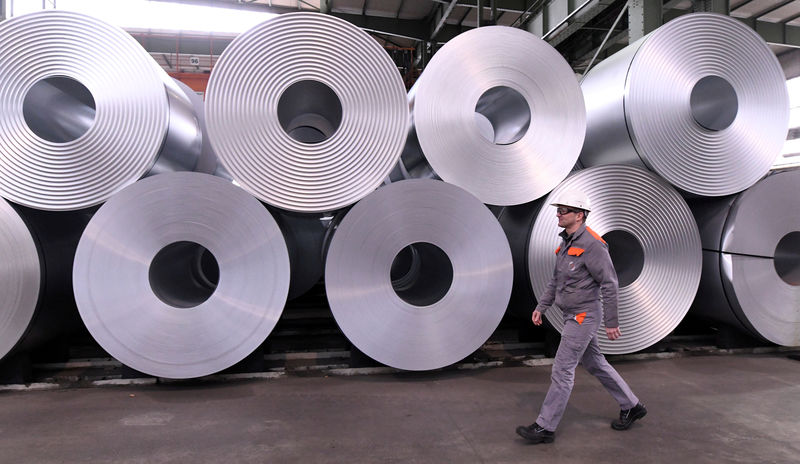By Paul Carrel
BERLIN (Reuters) - German industrial output unexpectedly fell in July, adding to signs that struggling manufacturers could tip Europe's biggest economy into a recession in the third quarter and supporting the case for the European Central Bank to take action next week.
Industrial output fell by 0.6% on the month, figures released by the Statistics Office showed, bucking expectations for a rise of 0.3%. The drop was driven by a decline in the production of capital goods.
"A recession in the industrial sector will continue," Bankhaus Lampe economist Alexander Krueger said. "That firms up the prospects of a technical recession."
Economists generally define a technical recession as at least two consecutive quarters of contraction.
June's output reading was revised to a fall of 1.1% from a previously reported 1.5% fall.
Germany's export-reliant economy is suffering from slower global growth and business uncertainty caused by U.S. President Donald Trump's 'America First' trade policies and Britain's planned, but delayed, exit from the European Union.
German Chancellor Angela Merkel said at the start of a visit to Beijing on Friday that the China-U.S. trade war affects the whole world and that she hopes it will be resolved soon.
But the weak output data reinforce the case for the ECB to take fresh action at its Sept. 12 policy meeting. The central bank has all but promised a stimulus package at the meeting and market expectations have been growing as Germany slows.
UNFOLDING NIGHTMARE
Official data published on Thursday showed weaker demand from abroad drove a bigger-than-expected drop in German industrial orders in July.
Germany's gross domestic product contracted by 0.1% quarter-on-quarter in the second quarter on weaker exports, with the decrease in foreign sales mainly driven by Britain and below-average demand from China.
A run of weak data since then has fueled concerns that the economy could tip into recession in the July-September period.
"The nightmare is now unfolding, and it can't be shaken off," Thomas Gitzel, economist at VP Bank Group, said after Friday's data.
Labour market data showed last week that seasonally adjusted unemployment rose in August, eroding a pillar of growth that has helped support Germany's traditionally export-driven economy.
With its sales abroad hit by a worsening trade climate, a global economic slowdown and the increasingly chaotic run-up to Brexit, the bulk of Germany's growth momentum is now being generated domestically -- a dependency that leaves it exposed to any weakening of the jobs market.
Goldman Sachs (NYSE:GS) Chief Financial Officer Stephen Scherr said on Thursday that the German economy is in the "early days of a slowdown".

The government expects economic growth to slow to 0.5% this year from 1.5% in the previous year. This would be the weakest expansion since 2013 when the euro zone struggled amid a sovereign debt crisis.